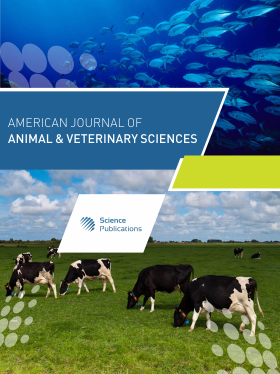Prevalence of Stray Dogs with Intestinal Protozoan Parasites
- 1 Shahid Bahonar University of Kerman, Iran
Abstract
Problem statement: Intestinal protozoan parasites are important enteropathogens in dogs. Moreover, several canine intestinal protozoan parasites are zoonotic and are considered important to public health. This study investigates the level of intestinal protozoan parasites in stray dogs, in Kerman city, Iran. Approach: Determination of the prevalence of infections was based on faecal examination. Stool samples (n = 98) collected from dogs of different ages and gender were analyzed using five techniques, i.e., centrifugal flotation in sucrose solution, centrifugal flotation in 33% Zinc solphate solution, Ziehl-Neelsen staining, trichrome staining and iodine staining. Results: The overall prevalence of parasitism was 13 (13.26%) dogs. The parasites most frequently detected were: Giardia spp. (7.14%), Isospora spp. (5.1%) and Cryptosporidium spp. (4.08%). Single parasitic infection was present in 11 (11.22%) dogs. There was no significant difference in the prevalence between male (13.3%) and female (13.2%) dogs (p>0.05). There was significantly (p<0.05) greater prevalence of parasites in dogs less than 1 year old. Conclusion/Recommendations: The results of this research showed that stray dogs are reservoirs for zoonotic intestinal protozoan parasites and should be considered important to public health. So that, it is imperative for human to avoid faecal contamination in streets, public gardens and parks. Also stray dogs should be euthanized in dog population control program in Iran.
DOI: https://doi.org/10.3844/ajavsp.2010.86.90

- 4,604 Views
- 5,546 Downloads
- 10 Citations
Download
Keywords
- Intestinal protozoan parasites
- Cryptosporidium
- Giardia
- Isospora
- Stray dogs
- Kerman
